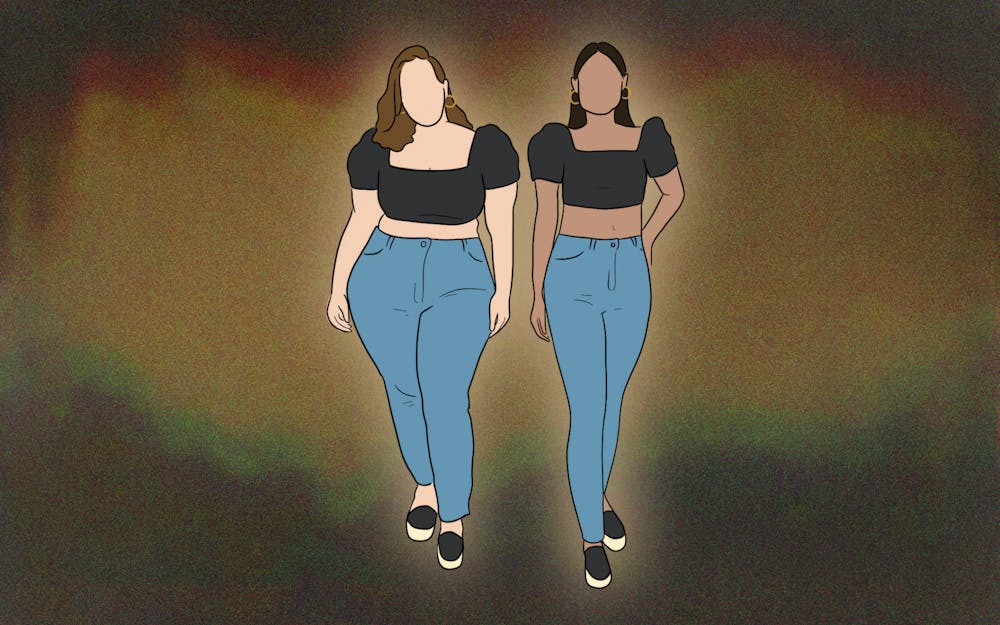I’ve never felt like I looked pretty.
Realistically, I know this isn’t factual. Throughout my life, family and friends have been kind about my appearance — telling me I’m beautiful even when I’m feeling hollow. However, this doesn’t wash away the ingrained notion that my attractiveness is equated to thinness.
When I was 17 years old, I downloaded MyFitnessPal, a calorie counting app on my phone. Each day at lunch I would scan the barcodes of my food. The ones I couldn’t scan, I would look up, trying to decipher how many calories are in a ham sandwich and if eating it would cause me to lose value.
However, this isn’t a story about a young woman’s relationship with her weight. It’s something almost everyone struggles with, regardless of gender identity. There is always some expectation you’re not meeting, some standard you can’t reach — and a lot of it is weight-related.
It seeps into different parts of your life, including what you wear. Different fashion blogs and Pinterest pages claim “it’s not what you wear, but how you wear it!” While encouraging a more body-inclusive society, I think trending fashion is intentionally designed with thinner bodies in mind — meaning, despite how depressing it may be, it really is about how clothes wear you.
Different fashion trends go in and out of style, and so do trending body-types. During the early 2000s it was a size double zero in low rise jeans. In the 2010s, it became about the BBL, making sure your body was as curvaceous as possible to appear feminine. It doesn’t matter if you are thin enough, or have the hourglass figure, if your body isn’t popular, the clothes aren’t going to be made with you in mind.
The thing is, it doesn’t matter if you have the perfect body, because it won’t be perfect forever. With fashion’s cycle, there is no guarantee something will stay infinitely trendy. Meaning your body, no matter how irrelevant it may seem, is truly its own trend.
Despite this, there are a number of ways that plus- and mid-sized women are still removed from fashion trends. The chain store Brandy Melville is notorious for exclusionary sizing and stores like Abercrombie & Fitch and Lululemon have a history of not-so-savory CEO comments concerning women’s sizes and attractiveness.
No matter how off-putting it may be, your body is an accessory. The way clothes are cut determines the fit, and some things are simply designed to hug a traditionally smaller body.
For me, this means I don’t wear low rise jeans anymore. I used to be able to, I was comfortable in them, then I gained weight and now, regardless of my best efforts, that specific style of pants don’t sit the way they used to. It doesn’t matter if I get them in the right size. In my experience, that specific cut isn’t made for my body anymore — and I’m not sure how I feel about it.
Exclusion in fashion is an issue, but as someone who is slightly mid-sized, I can still shop at any store I want. I never fear not having my size in stock or a store turning me away because they “don’t carry” anything above a size six.
However, this doesn’t remove the real issues of the fashion industry. Just because I can shop where I want doesn’t mean this is the same for everyone. It doesn’t mean every body size is seen as beautiful by society’s standards, despite the body positivity movement's efforts to create positive space. We still have a long way to go.
My body, whether I like it or not, is an accessory. It is something that people notice, that they take note of, that is given value. I wish it was different — but it’s not.
Curren Gauss (she/her) is a junior majoring in English with a minor in playwriting. She hopes to someday have a job.






